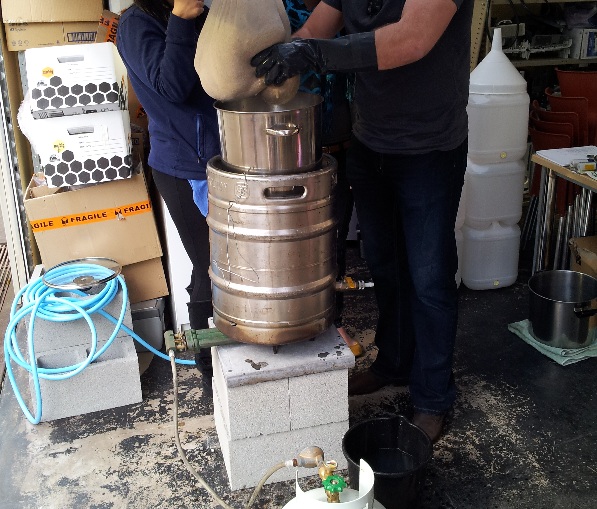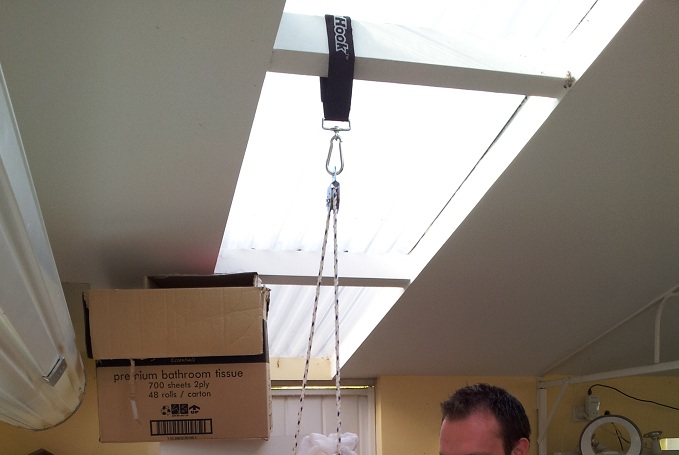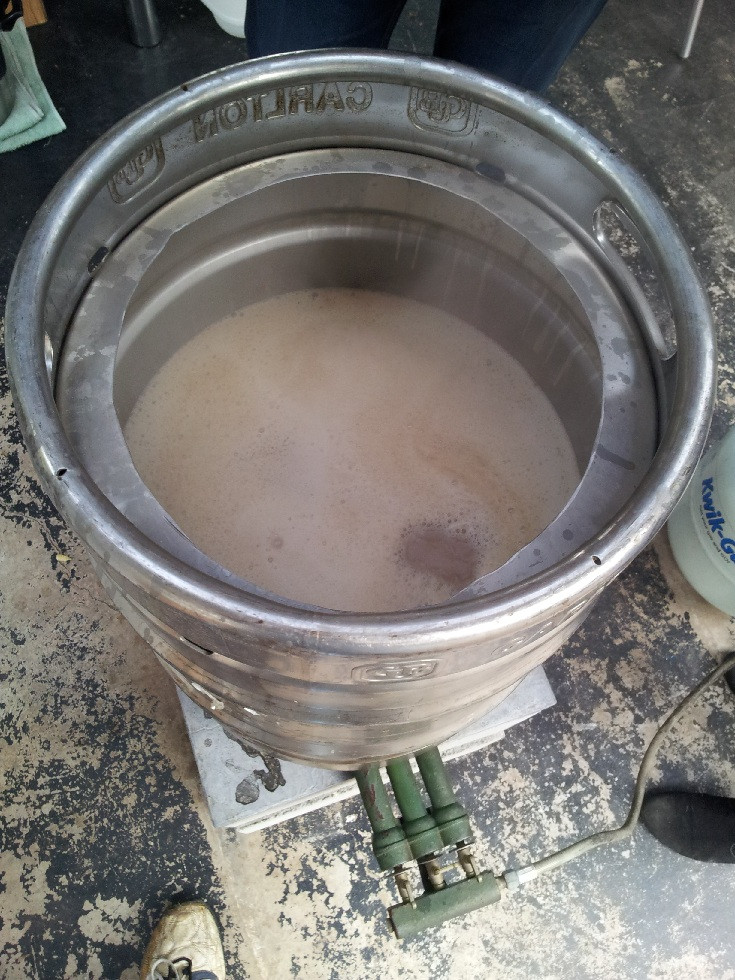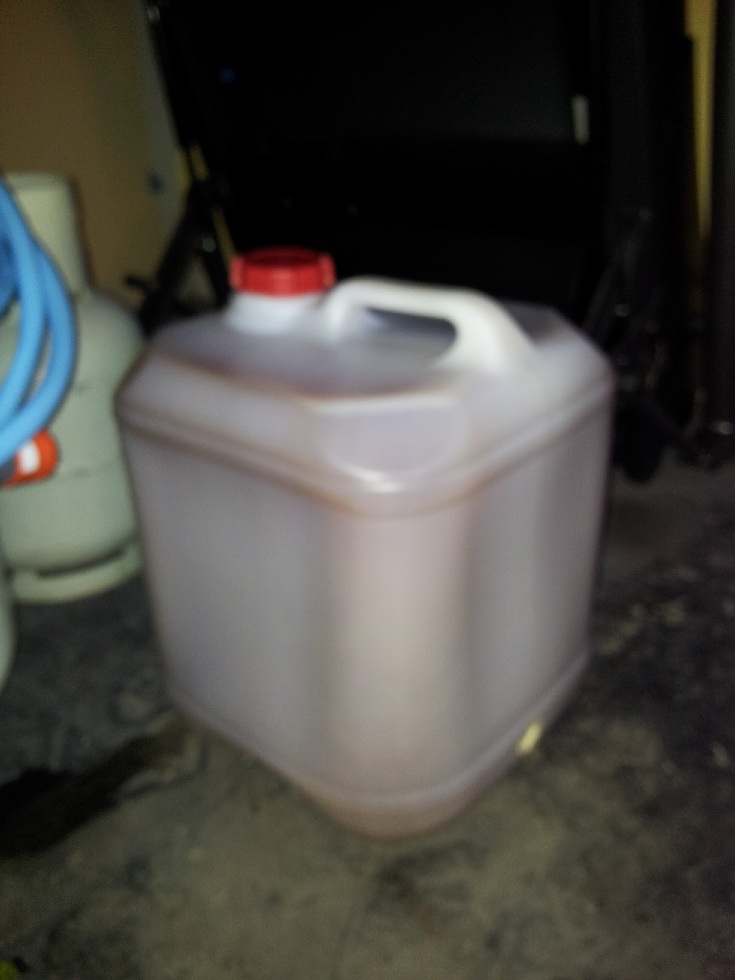DJ_L3ThAL
Such rapp, very bass
- Joined
- 11/5/10
- Messages
- 3,204
- Reaction score
- 1,452
Yesterday was my first full volume AG BIAB and it was overall, awesome fun had my sister and her fiancee around and they loved the process to (although they were drinking my stovetop all-grain on tap at the time which always helps...).
Aside from an initial hurdle of a leaking ball valve connection on the keggle wall (fixed with lots of heavy duty blue nylon tape), we were off and running at about 4pm mash in.
I made the mistake of buying those cheap $7 candy thermometers from Fleabay which have 5C graduations, perfect for getting my strike temp right :unsure: , luckily I have an IR thermometer which is very accurate. So the recipe is below:
Dr. Smurto's Golden Ale
American Pale Ale
Recipe Specs
----------------
Batch Size (L): 23.0
Total Grain (kg): 4.888
Total Hops (g): 63.25
Original Gravity (OG): 1.047 (°P): 11.7
Final Gravity (FG): 1.012 (°P): 3.1
Alcohol by Volume (ABV): 4.62 %
Colour (SRM): 6.6 (EBC): 12.9
Bitterness (IBU): 30.0 (Average)
Brewhouse Efficiency (%): 70
Boil Time (Minutes): 60
Grain Bill
----------------
2.760 kg Joe White Traditional Ale (56.47%)
0.920 kg Munich I (18.82%)
0.920 kg Wheat Malt (18.82%)
0.288 kg Caramalt (5.88%)
Hop Bill
----------------
17.3 g Amarillo Pellet (8.6% Alpha) @ 60 Minutes (Boil) (0.8 g/L)
23.0 g Amarillo Pellet (8.6% Alpha) @ 20 Minutes (Boil) (1 g/L)
23.0 g Amarillo Pellet (8.6% Alpha) @ 0 Minutes (Aroma) (1 g/L)
Misc Bill
----------------
0.5 g Irish Moss @ 10 Minutes (Boil)
Single step Infusion at 66°C for 90 Minutes. I decided to mash in 21L and prepare a 10L dunk sparge step which brewmate calculated needing to be 95C
The second issue was that after the 90min mash, the temperature at the grain surface (IR thermom) was saying it dropped to 55C. I just proceeded as I had my dunk sparge pot ready, so stirred that and let it sit for 15min, the keggle had (according to my tap water calibrated refractometer) 1.058 (temp corrected) and the dunk sparge pot ended up with 1.020. Combined and stirred through it was 1.048 (temp corrected).
I proceeded to boil for the 60mins and put all hops in correct although I forgot to add the Irish Moss tablet. I still decided to try and whirlpool, let that slow down almost to the point it was not visibly spinning and then drained through silicon hose into sanitised cube. There was about 1/2 cup of thick hop/break slurry at the bottom (I'm sure some of this ended up in the cube as we had to tilt the keggle to fill the cube as much as possible. I estimate the cube has 23L in it.
Final measurements were hydrometer (temp corrected just before filling the cube) 1.058
refractometer 1.055
hydrometer once sample had cooled to room temp (~22C) 1.055
All in all am happy with how it went, but I have three main concerns:




Aside from an initial hurdle of a leaking ball valve connection on the keggle wall (fixed with lots of heavy duty blue nylon tape), we were off and running at about 4pm mash in.
I made the mistake of buying those cheap $7 candy thermometers from Fleabay which have 5C graduations, perfect for getting my strike temp right :unsure: , luckily I have an IR thermometer which is very accurate. So the recipe is below:
Dr. Smurto's Golden Ale
American Pale Ale
Recipe Specs
----------------
Batch Size (L): 23.0
Total Grain (kg): 4.888
Total Hops (g): 63.25
Original Gravity (OG): 1.047 (°P): 11.7
Final Gravity (FG): 1.012 (°P): 3.1
Alcohol by Volume (ABV): 4.62 %
Colour (SRM): 6.6 (EBC): 12.9
Bitterness (IBU): 30.0 (Average)
Brewhouse Efficiency (%): 70
Boil Time (Minutes): 60
Grain Bill
----------------
2.760 kg Joe White Traditional Ale (56.47%)
0.920 kg Munich I (18.82%)
0.920 kg Wheat Malt (18.82%)
0.288 kg Caramalt (5.88%)
Hop Bill
----------------
17.3 g Amarillo Pellet (8.6% Alpha) @ 60 Minutes (Boil) (0.8 g/L)
23.0 g Amarillo Pellet (8.6% Alpha) @ 20 Minutes (Boil) (1 g/L)
23.0 g Amarillo Pellet (8.6% Alpha) @ 0 Minutes (Aroma) (1 g/L)
Misc Bill
----------------
0.5 g Irish Moss @ 10 Minutes (Boil)
Single step Infusion at 66°C for 90 Minutes. I decided to mash in 21L and prepare a 10L dunk sparge step which brewmate calculated needing to be 95C
The second issue was that after the 90min mash, the temperature at the grain surface (IR thermom) was saying it dropped to 55C. I just proceeded as I had my dunk sparge pot ready, so stirred that and let it sit for 15min, the keggle had (according to my tap water calibrated refractometer) 1.058 (temp corrected) and the dunk sparge pot ended up with 1.020. Combined and stirred through it was 1.048 (temp corrected).
I proceeded to boil for the 60mins and put all hops in correct although I forgot to add the Irish Moss tablet. I still decided to try and whirlpool, let that slow down almost to the point it was not visibly spinning and then drained through silicon hose into sanitised cube. There was about 1/2 cup of thick hop/break slurry at the bottom (I'm sure some of this ended up in the cube as we had to tilt the keggle to fill the cube as much as possible. I estimate the cube has 23L in it.
Final measurements were hydrometer (temp corrected just before filling the cube) 1.058
refractometer 1.055
hydrometer once sample had cooled to room temp (~22C) 1.055
All in all am happy with how it went, but I have three main concerns:
- Mash temp loss - what impact would this have dropping so low, what does sitting in the beta amalyse segment mean, more unfermentables in the finished wort? To combat this if I am unsuccessful in keeping a solid temp next time, would adding in a mash out step help that?
- Is the dunk sparge step just a waste of time? If I do a full volume mash and manage to do a really good squeeze from the bag would this be achieving (for my newb purposes) a relatively similar result to having the dunk sparge?
- Is the final SG too good to be true? Could I REALLY be getting better than 70% efficiency with the above process? Beginners luck?








